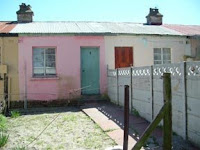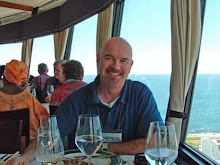
Saturday afternoon I booked a tour at the Whitechapel Bell foundry. Whitechapel is a area immediately east of the City (London proper, which is actually quite small). The Bell Foundry is the oldest continuously operating business in the UK, started in 1570, but has roots even a bit further back into the mid 1400's. They cast bells of all descriptions and sizes, from small bells for doors, to big bells for tower clocks.
 The owner was showing us around, he's the third generation of the current owners, and has worked in many of the workshops at the foundry. It has been located here since the mid 1700's, and the building is designated heritage building, so can't be modified too much. Sloping wooden floors, open rafters, steep narrow stair-cases, and 'primitive' conditions are the order of the day. In the casting room there were three bells which had been cast on Friday and were still warm on Sunday. These are medium sized bells of between one and two tons each.
The owner was showing us around, he's the third generation of the current owners, and has worked in many of the workshops at the foundry. It has been located here since the mid 1700's, and the building is designated heritage building, so can't be modified too much. Sloping wooden floors, open rafters, steep narrow stair-cases, and 'primitive' conditions are the order of the day. In the casting room there were three bells which had been cast on Friday and were still warm on Sunday. These are medium sized bells of between one and two tons each. Tuning bells is tricky. They're cast to be flatter than the pitch desired and then tuned 'up.' If they go to high, there's no way to bring the pitch down. Larger bells have five dominant tones, and after being cast the five tones can be out of tune by different amounts. To bring all the tones to the correct pitch at the same time, material is removed from the bell at different points on the inside of the bell, using a giant lathe.
Tuning bells is tricky. They're cast to be flatter than the pitch desired and then tuned 'up.' If they go to high, there's no way to bring the pitch down. Larger bells have five dominant tones, and after being cast the five tones can be out of tune by different amounts. To bring all the tones to the correct pitch at the same time, material is removed from the bell at different points on the inside of the bell, using a giant lathe. Whitechapel also make handbells for choirs. They actually make a set which is the full range of a piano. These are cast in a different way, cut on the lathe to bring close to pitch, and then polished to a high finish that brings it to perfect pitch. This is the only section of the factory that is air-conditioned -- the hot summers have driven the temperature in the attic (where they finish the bells) so high that the accuracy of the pitch was being affected. The owner joked (sorta) that the priority was the bells, not the comfort of the staff!
Whitechapel also make handbells for choirs. They actually make a set which is the full range of a piano. These are cast in a different way, cut on the lathe to bring close to pitch, and then polished to a high finish that brings it to perfect pitch. This is the only section of the factory that is air-conditioned -- the hot summers have driven the temperature in the attic (where they finish the bells) so high that the accuracy of the pitch was being affected. The owner joked (sorta) that the priority was the bells, not the comfort of the staff! It's rather neat to see the workshop with bells of all sizes just stacked like cord-wood. Many are old bells being brought in for 'service.' Bells don't require repairs or service in the usual sense; unless they crack or break, they're good for ever. But often the pitch was not accurate, and they're brought in for tuning accurately using modern equipment. The other task is removing the yokes on old bells for more secure mounting. The yokes are liable to breakage, and are also no suitable for change ringing.
It's rather neat to see the workshop with bells of all sizes just stacked like cord-wood. Many are old bells being brought in for 'service.' Bells don't require repairs or service in the usual sense; unless they crack or break, they're good for ever. But often the pitch was not accurate, and they're brought in for tuning accurately using modern equipment. The other task is removing the yokes on old bells for more secure mounting. The yokes are liable to breakage, and are also no suitable for change ringing.Whitechapel has been making bells for all over the world. The new set of bells of St. James Cathedral in Toronto was a recent installation. One of their biggest bells at 11 tons was installed in Montreal, and the biggest and most famous bell is Big Ben, at over 13 tons.





























